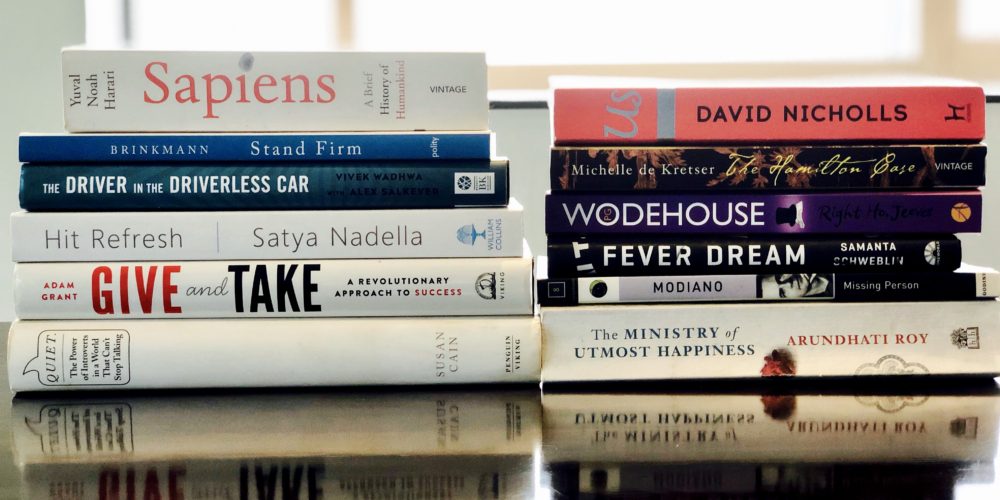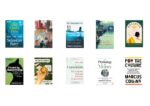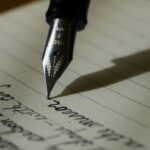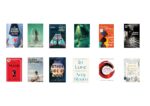My Top 12 Books of 2017

It’s that time of year, so here they are: the best books I read in 2017. If you confined me to just 12 books in the year, this is the dozen I would hope to end up with.
My regular caveat first: reading is a very personal endeavour. The value of a book is squarely in the mind of the reader. What I loved is what you might find unreadable. So this is not a list of books I think will be great for you; it’s merely my personal top twelve from the past twelve months.
Please note: these were not books that were necessarily published last year; a few were, but many had been on my bookshelves for years. I just happened to read them last year.
*************************************
Let’s start with NON-FICTION. 2017 gave me some real heavyweights:
Quiet By Susan Cain
Quiet came out unquietly some years ago, and I decided to reread it last year. It remains a seminal work. It debunks the everyday notion of introverts as shy, bookish, socially-awkward, withdrawn types. Quiet was a revelation that clapped for the quiet people and affirmed why they really matter. Susan Cain takes us through the many things that introverts offer the world: deep thinking, considered views, balanced opinions. In a world dominated by rapid-fire extroverts, the quiet ones are often left undervalued. Yet many of history’s advances and most of human art have come from those who take time to talk less and think deeply. I’m glad I went back to Quiet in 2017.
Give and Take by Adam Grant
I read Give and Take in January 2017, and I knew even then it would end up on this list. Adam Grant is a Wharton professor and consultant to leading corporations, and here he takes us through a journey that confirms giving is good: being generous and kind is actually a pathway to success, not to being suckered. People who learn how to give properly rise without cutting anyone down, and grow the pie for everyone without snatching the biggest pieces. This is not a touchy-feely book about kindness, please note; it is an evidence-based study that points out that genuine givers are winners: they naturally gather a powerful network of supporters around them and create more lasting impact than those who merely manipulate for self-gain. Read this book to understand true success.
Hit Refresh by Satya Nadella
I don’t, as a rule, read biographies. The strategist in me is more interested in broad sweeps than in the minutiae of individual lives, and autobiographies full of me-me platitudes fill me with despair. Not this one, though. Microsoft’s young CEO has already brought his giant corporation back from confusion and disarray to clarity and innovation. This book – written, unusually, at the beginning of the CEO journey rather than the end – is a candid look at the trenches of disruption, and how a wise and determined leader can refresh a troubled enterprise by focusing on some human essentials: empathy and culture. Read it if you’re on a journey of business reinvention yourself.
The Driver In The Driverless Car by Vivek Wadhwa with Alex Salkever
I read many books about technological disruption, and this was my was pick of the 2017 releases. It is a very readable survey of what might hit us in the decade ahead, and what we should make of it all. If you’re looking for an explainer for self-driving cars, robotics, AI and the like, this is for you. Vivek Wadhwa is excellent at explaining the implications of new technologies, and warns us that the consequences could be wonderful or nightmarish – we have to proceed very carefully. This is a book for CEOs as well as policy makers, parents and educators.
Stand Firm by Svend Brinkmann
Stand Firm was a contrarian delight. As we all get schooled in positive thinking and schmaltzy feel-good utopianism, Svend Brinkmann asks us to stand firm and resist. Stay negative! Understand your true nature and flaws as a human, and learn to deal with difficulty, not run away from it. The idea is not to descend into suicidal gloom, but to succeed at life by dealing with its harsh realities. This is not new: Brinkmann is actually reviving the thinking of the classical Stoics, who taught that we must be unflinching in our acceptance of our mortality, and that we must cultivate resilience and adaptation in the face of life’s gusting winds. What’s excellent here is the modern context: we are asked to stop trying to find ourselves, to sack our coaches and to suppress our feelings! Many of you will rail against this message, but if you want a provocative and challenging read, this is the one.
Sapiens by Yuval Noah Harari
What do you make of a book that calls itself ‘a brief history of humankind’? If you equate history with dull school lessons, prepare to be jolted awake. I use coloured transparent stickers to mark key pages in the the best books as I read them, but had I done that for this epic I would have exhausted my precious stock. There are revelations and startling insights in every chapter, and some of them make you literally stop and pause. I usually read a book in no more than three or four sessions, but I decided to slow down and take my time with this one. It is a wonderfully clear-headed sweep through human history across millions of years. It explains why we have evolved the way we have, and what sets humans apart from all the other animals around us. It is a bracing and revelatory read, challenging much perceived wisdom about our origins and developmental path. To my surprise, it even taught me some interesting lessons about management and organizations. A real heavyweight, and a must-read for anyone who wants to understand our species better.
*************************************
Moving on to FICTION, I was happy to get through some remarkable works in 2017. These were the best:
Us by David Nicholls
I loved the author’s breakout book, One Day, and this too is a vivid and very human triumph. It’s a hilarious family drama in which a man tries to take his want-away wife and surly teenage son on a tour through Europe’s art galleries in order to save his marriage. David Nicholls can combine tear-inducing humour with genuine insight about relationships, and this book manages to be simultaneously hilarious and sad. I laughed out so many times I lost count; and yet I laughed knowing there was pain to come. Such is life, and this is a unique voice chronicling its delights and its pathos. The author may never win a literary award, but I will always queue up for his books.
The Hamilton Case by Michelle de Kretser
There can be no doubting this author’s literary credentials. This is a remarkable family saga set in colonial Ceylon. The title is tongue-in-cheek: it’s not about a murder case at all. A murder does take place; a man called Hamilton is found dead; there is a detective and there is a mystery. But that is all incidental to the real story, which has a vibrant cast of a family of borderline lunatics living through the tumultuous changes brought about by colonialization and its aftermath. The writing is the thing here: luscious jungle locales, withering wit, a procession of standout sentences that reveal the author’s poetic temperament. If it’s literature you want, this is the real deal.
Right Ho, Jeeves by P G Wodehouse
P G Wodehouse cracks me up, every time. I have no idea how I missed this title in my misspent youth, because it’s probably the best of the Jeeves and Wooster collection. Bertie Wooster is busy sticking his upper-class nose into other people’s romantic affairs, with predictably catastrophic results. His butler, the unflappable Jeeves, is compelled to clean up the mess as always. Wodehouse conjures up a bygone world of landed gentry and servile staff so deftly that one is lost in time. In addition the lost art of sardonic English humour is at its pinnacle here; I literally burst out laughing on every single page, bar none. A book to lift you out of glumness.
Fever Dream by Samanta Schweblin
This was by some margin the most original fiction I read last year. Told entirely as dialogue, it is gripping from page one. A dying woman is in hospital; a boy is interrogating her. What has happened here? We have to work it out as the troubled conversation ensues, and somehow the author places us in the same ‘fever dream’ as her protagonists. It is so cleverly written that we encounter the same confusion and distress as those we are reading about. This is a powerful tale about nefarious goings-on in Argentina (I’ll say no more) but the real wonder is in the writing style. Utterly unique and extremely disquieting. I intend to read it all over again very soon.
Missing Person by Patrick Modiano
I like Modiano so much that a place in this annual list is pretty much guaranteed for him. Missing Person was the first book I read by him, right after he won the 2014 Nobel Prize for Literature. I went back to it last year, to revisit those foggy Parisian streets with a detective who’s looking for himself. He suffers from amnesia, and has no idea who he was in the past. He goes from person to person picking up anecdotes and clues, piecing together who he was and what may have happened to him. Modiano is the master of place and atmosphere, and his obsessions are the fragility of identity and the trickery of memory. He puts them to great effect in this classic. His books are always very short, but they stay with you for a long time after you’ve put them down.
The Ministry of Utmost Happiness by Arundhati Roy
Fans of the 1997 masterpiece The God Of Small Things waited and waited for Arundhati Roy to write a new novel. She delivered – twenty years later. Her new book is another epic, but the two-decade gap meant it is written by a very different writer. This is the passionately fiery activist in play, writing a story that reflects her rage at the tyrannies and injustices of successive Indian governments. That anger both makes and mars this novel, and it is a difficult and repetitive read in some chapters. And yet this is Arundhati, and her mastery of storytelling shines through. An entirely quirky troupe of characters populate this lush and dense work, and the final effect is to enrich the reader with wisdom and insight.

Buy Sunny Bindra's new book
The X in CX
here »
Popular Posts
- How to ruin what you loveMay 25, 2025
- The pause that saves usJune 8, 2025
- The first push is the hardestJune 1, 2025
- How to spot a real thinkerJune 15, 2025
- The ultimate flex—modestyMay 18, 2025















